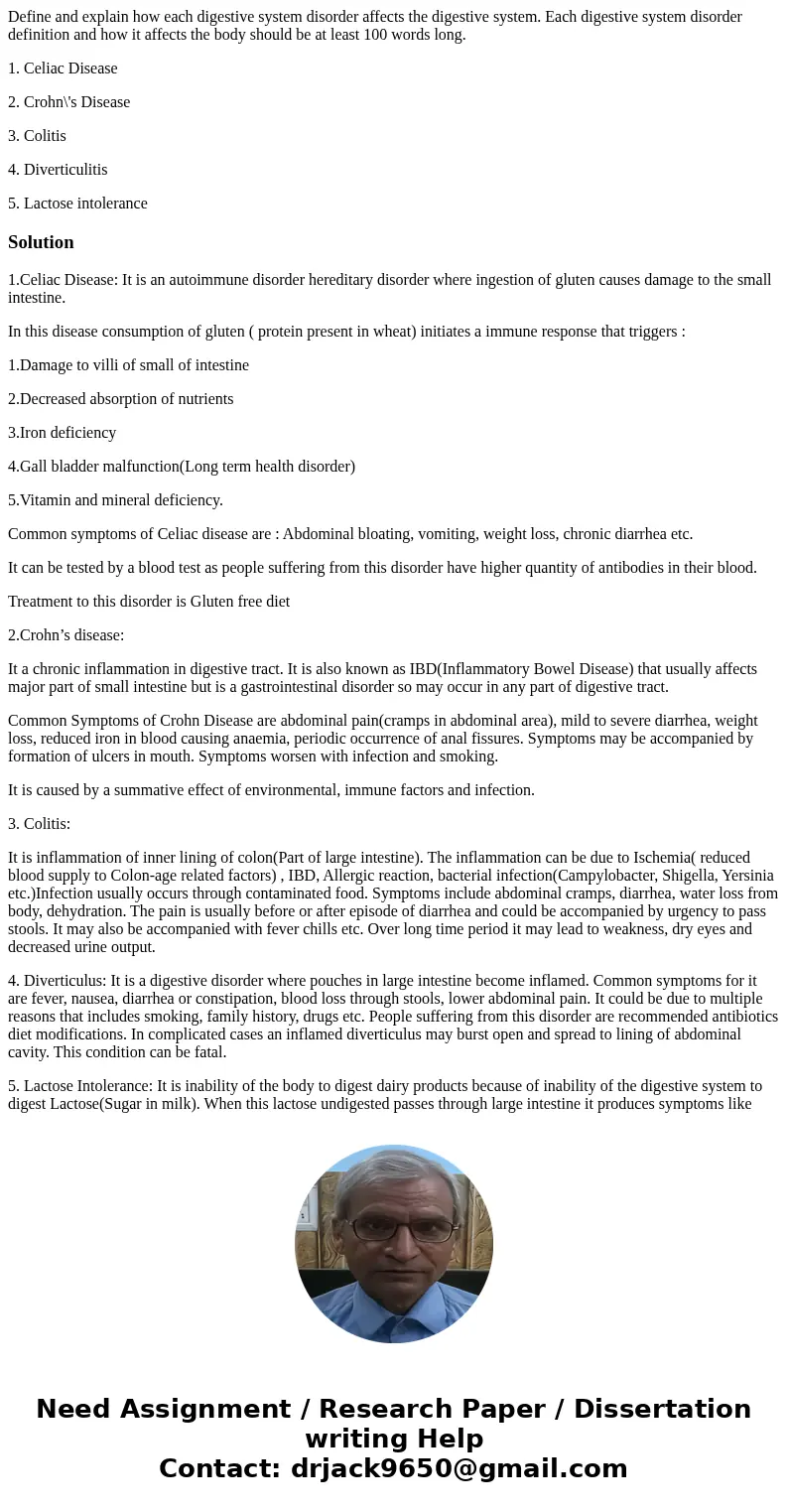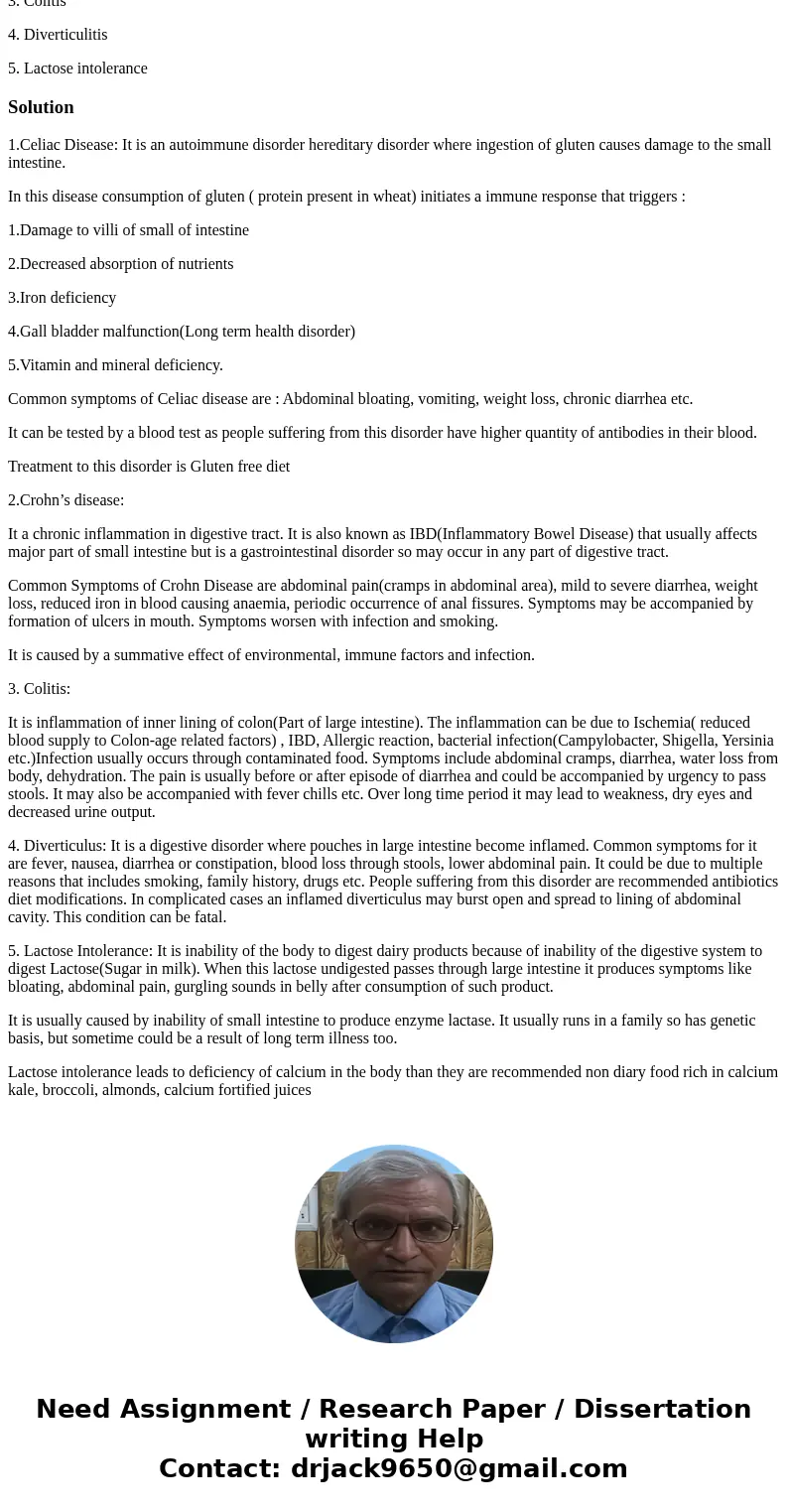Define and explain how each digestive system disorder affect
Define and explain how each digestive system disorder affects the digestive system. Each digestive system disorder definition and how it affects the body should be at least 100 words long.
1. Celiac Disease
2. Crohn\'s Disease
3. Colitis
4. Diverticulitis
5. Lactose intolerance
Solution
1.Celiac Disease: It is an autoimmune disorder hereditary disorder where ingestion of gluten causes damage to the small intestine.
In this disease consumption of gluten ( protein present in wheat) initiates a immune response that triggers :
1.Damage to villi of small of intestine
2.Decreased absorption of nutrients
3.Iron deficiency
4.Gall bladder malfunction(Long term health disorder)
5.Vitamin and mineral deficiency.
Common symptoms of Celiac disease are : Abdominal bloating, vomiting, weight loss, chronic diarrhea etc.
It can be tested by a blood test as people suffering from this disorder have higher quantity of antibodies in their blood.
Treatment to this disorder is Gluten free diet
2.Crohn’s disease:
It a chronic inflammation in digestive tract. It is also known as IBD(Inflammatory Bowel Disease) that usually affects major part of small intestine but is a gastrointestinal disorder so may occur in any part of digestive tract.
Common Symptoms of Crohn Disease are abdominal pain(cramps in abdominal area), mild to severe diarrhea, weight loss, reduced iron in blood causing anaemia, periodic occurrence of anal fissures. Symptoms may be accompanied by formation of ulcers in mouth. Symptoms worsen with infection and smoking.
It is caused by a summative effect of environmental, immune factors and infection.
3. Colitis:
It is inflammation of inner lining of colon(Part of large intestine). The inflammation can be due to Ischemia( reduced blood supply to Colon-age related factors) , IBD, Allergic reaction, bacterial infection(Campylobacter, Shigella, Yersinia etc.)Infection usually occurs through contaminated food. Symptoms include abdominal cramps, diarrhea, water loss from body, dehydration. The pain is usually before or after episode of diarrhea and could be accompanied by urgency to pass stools. It may also be accompanied with fever chills etc. Over long time period it may lead to weakness, dry eyes and decreased urine output.
4. Diverticulus: It is a digestive disorder where pouches in large intestine become inflamed. Common symptoms for it are fever, nausea, diarrhea or constipation, blood loss through stools, lower abdominal pain. It could be due to multiple reasons that includes smoking, family history, drugs etc. People suffering from this disorder are recommended antibiotics diet modifications. In complicated cases an inflamed diverticulus may burst open and spread to lining of abdominal cavity. This condition can be fatal.
5. Lactose Intolerance: It is inability of the body to digest dairy products because of inability of the digestive system to digest Lactose(Sugar in milk). When this lactose undigested passes through large intestine it produces symptoms like bloating, abdominal pain, gurgling sounds in belly after consumption of such product.
It is usually caused by inability of small intestine to produce enzyme lactase. It usually runs in a family so has genetic basis, but sometime could be a result of long term illness too.
Lactose intolerance leads to deficiency of calcium in the body than they are recommended non diary food rich in calcium kale, broccoli, almonds, calcium fortified juices


 Homework Sourse
Homework Sourse